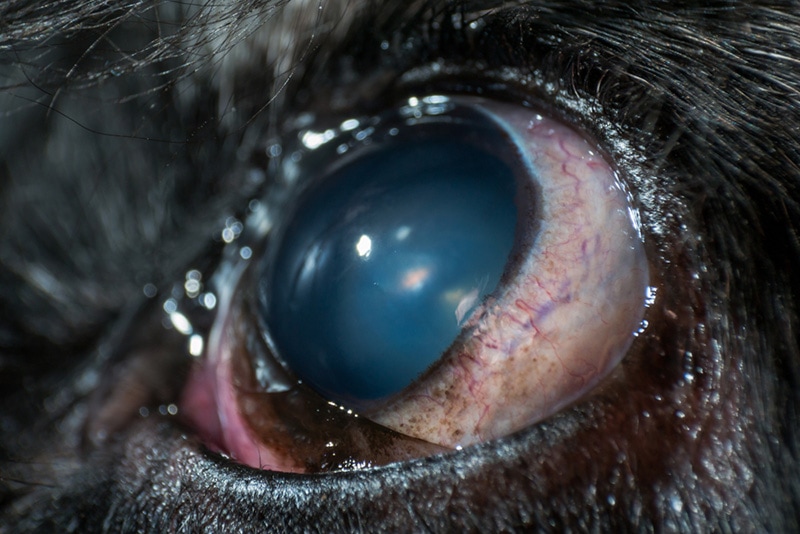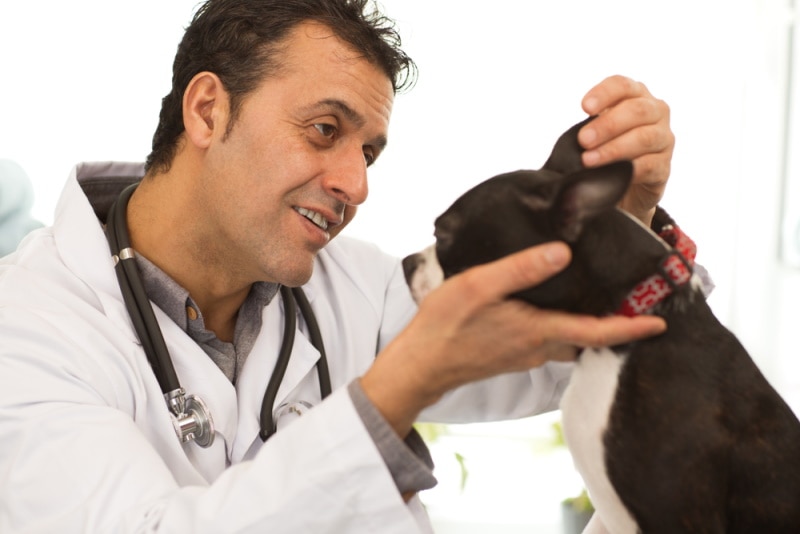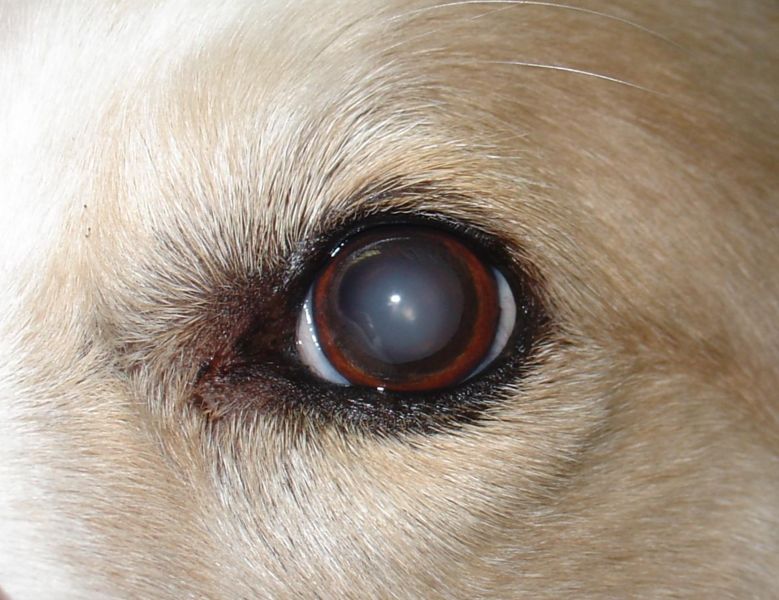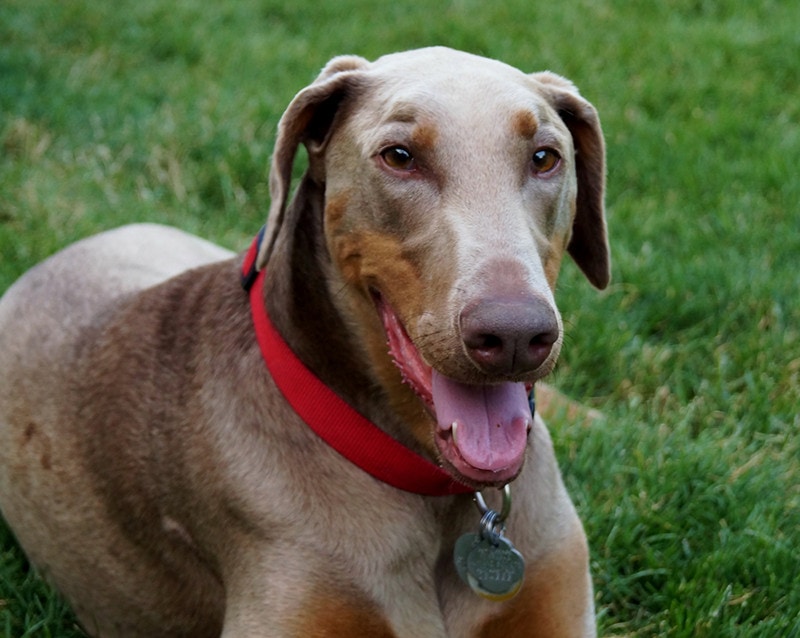How Much Does Dog Cataract Surgery Cost? 2024 Price Guide
Updated on

Cataracts are a common eye condition in dogs and humans that may eventually lead to your pup going blind. The only way to treat cataracts is by having them surgically removed, which can cost about $3,500 on average. In this article, you’ll learn how much dog cataract surgery costs, potential additional costs that could increase the overall price, and whether pet insurance covers this procedure.
The Importance of Cataract Surgery
Within the dog’s eye, a structure called the retina is responsible for vision. Just in front of the retina is a lens that functions to focus and filter light, allowing the dog to see. A cataract is a cloudy lens.1
When the lens is clouded, the light can’t pass through, and the dog’s vision is impacted. Generally, dog owners explore cataract surgery because they don’t want their dogs to go blind.
Cataracts can also cause secondary eye conditions like glaucoma (increased pressure within the eye) and inflammation. These conditions may be painful and damaging to the eye. Cataract surgery is sometimes necessary to avoid or treat secondary conditions.

How Much Does Dog Cataract Surgery Cost?
Cataract surgery is a specialized procedure that must be performed by a veterinary ophthalmologist. If you’re interested in cataract surgery, your vet will refer you to the closest ophthalmologist. Most dog eye doctors prefer to provide you with a personalized cost estimate for surgery because there are so many variables involved.
Based on our research, you can expect to pay between $2,700-$4,200 for your dog’s cataract surgery.2 The average cost is about $3,500.3 The biggest factor that will impact the cost of your dog’s surgery is whether they need cataracts removed from one eye or both. The larger your dog, the more prices will increase because more anesthesia and medications are required.
If your dog has other health conditions, such as diabetes, your costs may increase due to complications from these medical problems. The exact surgical procedure used to remove your dog’s cataracts can also vary, which can change the cost. Average veterinary costs in your area will also impact how much you pay for cataract surgery. Vets in areas with a high cost of living, such as Los Angeles and New York, will likely charge more.

Additional Costs to Anticipate
Cataract surgery typically involves extensive follow-up care, medications, and recheck visits with the eye doctor. Some of these may be included in the original surgery estimate, but if your dog experiences complications, you may have additional costs.
Most eye doctors require an initial consultation and various tests to ensure your dog and their eyes are healthy enough for the surgery. These costs usually aren’t included in the surgery fee. If your dog’s diabetes is not well-controlled, the eye doctor may want that handled before cataract surgery. You could have additional costs for blood tests and vet visits while you try to get their blood sugar levels stable.
Can You Prevent Cataracts?
Most dogs develop cataracts due to genetics. Certain breeds are more at risk, and the condition is often inherited. As we mentioned, dogs with diabetes often develop cataracts. Cataracts can also develop as dogs age or result from an eye injury.
As you can see, most causes of cataracts can’t be prevented. However, if you’re buying a puppy from a breed known to inherit cataracts, ask if the parents have had their eyes checked and certified by an ophthalmologist. Also, ask if there is a history of cataracts in the family medical history.
These precautions may not completely prevent your dog from developing cataracts but could decrease their risk.

Does Pet Insurance Cover Dog Cataract Surgery?
Every pet insurance is different, and you must read the specific policies carefully. Many pet insurance policies cover cataract surgery as long as it isn’t considered a pre-existing condition. Also, make sure your pet insurance policy covers inherited or genetic conditions.
Because cataract surgery is so expensive, confirm whether your pet insurance policy has an annual coverage limit or a per-incident cap on how much they’ll pay out. And, of course, you’ll need to meet your deductible before any costs are covered.
Will Your Dog Need Cataract Surgery Again?
A recent study by a veterinary ophthalmologist in New Jersey found that 86% of dogs who had cataract surgery could still see long-term. Those who lost their vision did so due to other complications, not because cataracts returned.
Your dog probably won’t need cataract surgery again, but not all patients will continue to see clearly afterward. You can help increase the chances of success by carefully following all your ophthalmologist’s post-surgery directions regarding medications and recheck appointments.
Generally, your dog will need careful monitoring and frequent medications in the days right after surgery. If you’re unsure whether you can meet these demands, talk to your ophthalmologist.

Final Thoughts
Cataracts can affect dogs of any age and breed, eventually causing vision loss. There’s no way to predict how fast or even if your dog will go blind. Because dogs don’t rely on their vision as humans do, most adapt quite well to losing their sight. If you aren’t sure whether you can tolerate the cost of cataract surgery or the post-surgical care involved, talk to your vet or the veterinary eye doctor to find out what your other options might be.
Featured Image Credit: Mary Swift, Shutterstock












